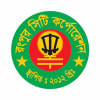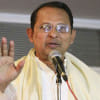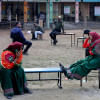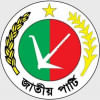Curtain falls today on friendly Sangsad
The 10th parliament sits for the last time today, with the main opposition Jatiya Party setting a rare example in the history of the country's parliamentary democracy.
The HM Ershad-led party, which also has three of its members in the cabinet, did not submit a single proposal for discussions on issues of public interest, known as motion of adjournment, which is unheard of since democracy was restored in 1991.
The 10th House sat for 410 days in 23 sessions and passed 191 bills with little or no opposition from the JP. Two more bills are likely to be passed today, parliament secretariat sources said.
Formed through the largely one-sided election on January 5, 2014, the current parliament sat in its maiden session on January 29 that year.
In any of the sessions since then, the JP did not place any adjournment motion to discuss specific or urgent public issues, according to the sources.
“This House didn't see any serious debate between the treasury and the opposition on important public issues. The role of Jatiya Party as the main opposition was nothing less than a mockery,” said Hafizuddin Khan, former adviser to a caretaker government.
The treasury bench faced no hurdles to pass any of the 191 bills as only a few JP lawmakers took part in discussions during the passage of the bills. And although some of them opposed some of the bills, they either voted for the bills or remained silent.
Under the constitutional provisions, MPs lose their seats if they vote against the party line.
Also, in a departure from the culture of parliament boycott, the JP staged only a few boycotts, only to return to the session within minutes.
This was a positive development, analysts said.
The “constructive” role of JP MPs in parliament has been lauded by top AL leaders, including Prime Minister Sheikh Hasina, on many occasions.
But Hafizuddin, also president of Shushasoner Jonno Nagorik (Shujan), said the JP failed to emerge as an effective main opposition party.
A key reason for that is the party has three ministers in the cabinet. Also, JP chief HM Ershad is a special envoy to the prime minister with the status of a minister, a JP MP told The Daily Star, asking not to be named.
“All of this was rewards from the government for Jatiya Party's participation in the 2014 election, which was vital in the face of BNP's boycott,” said the JP lawmaker.
Transparency International Bangladesh (TIB) Executive Director Dr Iftekharuzzaman said: “This parliament will be a subject of debate and discourse for years to come not merely for the fait accompli as it came about in the wake of the controversial election that led to its creation, but also for its rather eventful tenure.”
He also said while little time was spent on substantive debate on law-making or on issues of accountability in public interest, the largest share of the valuable time in the House was spent on rhetorical speeches of self-appreciation on the one hand and abuse against political opposition outside parliament on the other.
Opposition Leader in parliament Raushan Ershad and JP chief Ershad themselves acknowledged on several occasions that people consider JP a part of the government, not a real opposition in parliament.
For example, on February 27 this year, Raushan told parliament in Hasina's presence, “Drop the three Jatiya Party members from the cabinet. If you [Hasina] do it, Jatiya Party will survive and will be able to play its due role with dignity.”
Earlier on April 12, 2016, Ershad told a press conference, “We have become a domestic opposition party now. We could have come to power if we could become a real opposition party in parliament.”

 For all latest news, follow The Daily Star's Google News channel.
For all latest news, follow The Daily Star's Google News channel. 







Comments